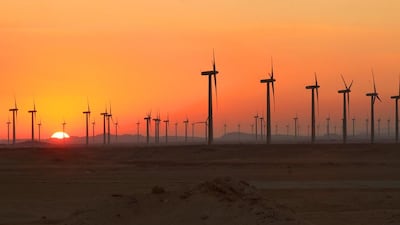Saudi Arabia’s inaugural 400MW wind project has received four bids with the kingdom likely to award the scheme late June as the world’s largest oil exporter incorporates more renewable into its grid to free up crude for export.
Acwa Power of Saudi Arabia, France’s EDF Energies Nouvelles, Italy’s Enel Green Power and France's Engie are the four bidders on the planned scheme at Dumat Al Jandal, in the northern Al Jouf region, according to a statement from the Saudi energy ministry’s Renewable Energy Project Development Office.
The bids will remain sealed until the opening bid ceremony, the statement said. Sources close to the bid process told The National that the wind project is expected to be awarded in late June.
___________
Read more:
More renewable projects in the pipeline for GCC countries in 2018
Saudi Arabia shortlists bidders for first solar power project
___________
Saudi Arabia, which largely burns oil to generate power, has set ambitious targets to add 9.5 Gigawatts of renewables by 2023, as it looks to sell more of its crude to export markets. The Saudi energy ministry’s renewables office is expected to tender 3.25GW of solar and 800MW of wind capacity this year alone.
Paddy Padmanathan, chief executive at Saudi renewables developer Acwa Power, said last month that the kingdom would break ground on the wind project this year.
"The wind project should not only be awarded this year, it should go to construction this year. I expect it to be awarded and in financial close this year,” he said in Dubai at the time.
Mr Padmanathan, whose company won the kingdom’s first 300MW solar photovoltaic project earlier this year, said Saudi Arabia would likely tender the capacities in “11 renewables tenders” - eight for PV and two for wind.
The kingdom’s upcoming wind project was likely a good combination of a bankable and low-cost scheme and is in line with the global trend towards hybrid projects that combine both solar and wind, said Cornelius Matthes, board member at Middle East Solar Industry Association.
"Saudi Arabia has very good wind spots. The average wind speed is of course crucial for getting lower costs of electricity. Wind tends to be blowing stronger when there’s no sun, so in the night for example,” said Mr Matthes.
“Wind and solar and intermittent sources are perfectly complimenting existing generation, which is oil and gas fired in Saudi Arabia."
Saudi Arabia last month signed a $200bn deal to develop the world’s largest solar power development project.
The scheme is expected to have 200GW of solar power capacity and will be developed in collaboration with Japan’s SoftBank.
The Public Investment Fund, the kingdom's sovereign wealth fund, has committed to invest as much as $45bn in Softbank's $100bn Vision Fund.
The planned scheme comes amid Saudi Arabia’s plans to develop a $500bn sustainable city called Neom straddling the Egyptian and Jordanian borders.
Saudi Arabia is set to break ground on its first ever solar plant later this year.
The $302 million facility at Sakaka will be developed on the basis of an independent power producer model and is backed by a 25-year power purchase agreement with the Saudi Power Procurement Company.


